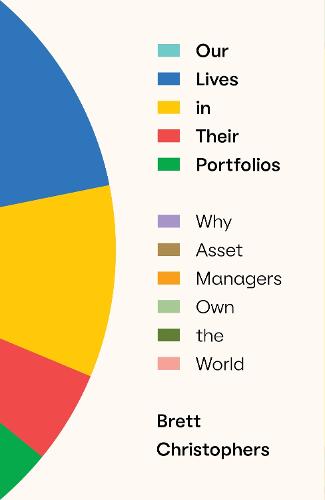“As the owners of more and more of the basic building blocks of everyday life, asset managers shape the lives of each and every one of us in profound and disturbing ways.” [Brett Christophers]
.
The exact nature of the Thames Water set-up is only just coming to light: OMERS, BCI risk reputation hit from Thames Water investments | Financial Post
As an institutional investor, OMERS has assets under management valued at Can$124 billion, with most of its exposure in private equity, infrastructure, and real estate. One of the crown jewels of its portfolio is Thames Water, the private utility company that supplies me with drinking water in north London an ocean away… Asset-Manager Firms Are Taking Over the Social Infrastructure on Which We All Depend
Private asset managers and public services in the UK
A little reading for the beach this summer:

Our Lives in Their Portfolios: Why Asset Managers Own the World
Banks have taken a backseat since the global financial crisis over a decade ago.
Today, our new financial masters are asset managers, like Blackstone and BlackRock. And they don’t just own financial assets. The roads we drive on; the pipes that supply our drinking water; the farmland that provides our food; energy systems for electricity and heat; hospitals, schools, and even the homes in which many of us live-all now swell asset managers’ bulging investment portfolios. As the owners of more and more of the basic building blocks of everyday life, asset managers shape the lives of each and every one of us in profound and disturbing ways.
In this eye-opening follow-up to Rentier Capitalism, Brett Christophers peels back the veil on “”asset manager society.”” Asset managers, he shows, are unlike traditional owners of housing and other essential infrastructure.
Our Lives in Their Portfolios by Brett Christophers | Foyles
There are lots of examples covering a multitude of types of asset, as provided in the multiple positive reviews from the media – including the financial press:
In 2016-17, Macquarie-owned Thames Water missed its regulator’s leakage targets by 47mn litres a day through under-investment yet paid £239mn of dividends to shareholders. Housing, hospitals, schools, farmland, green energy: no sector is safe. Our Lives in Their Portfolios — owners in the shadows | Financial Times
“The infrastructural response to climate change both in terms of mitigation and adaptation is essentially being outsourced by governments to the private sector.” Brett Christophers: Be wary of outsourcing climate change response to ‘ruthlessly extractive’ asset managers – CityAM
To the extent that asset managers own housing and infrastructure we rely on, and determine how much it costs for us to live in that housing and use that infrastructure, they also determine the conditions in which those assets exist, and they have a huge impact on our daily lives that people just haven’t been talking about much. Profit-Hungry “Asset Managers” Are Gaining Power Over Housing, Hospitals, Water, and More – Business News
They wield huge power over your day-to-day life, without consent or oversight. Who are they? Asset managers | Brett Christophers | The Guardian and Asset managers control a growing share of society’s essentials [The Economist: paywall] and Our Lives in Their Portfolios by Brett Christophers review — sold off, sold out [The Times: paywall]
This spring, swimmers in Kent were told to avoid ten beaches in the county due to sewage leaks. Public outrage at sewage pouring into our rivers and beaches has so far focused on water companies. But is someone else to blame? The pipes that carry sewage in Kent are not owned by Southern Water, or even Kent County Council. They belong to a massive Australian asset management firm that most of us have never heard of. New Economics Podcast: Why asset managers own the world | New Economics Foundation
Private asset managers and Devon
To what extent are these activities happening in Devon? Here are a couple of examples:
The PropCo announced in April 2016 it was to start charging market rents to its NHS tenants with immediate effect. The company has already commercialised the leases on the properties it acquired. The biggest transfer of properties so far took place in December 2016, when the company completed the acquisition of the freeholds of 12 Community Hospitals in Devon into its ownership, with the last line of their press release stating: ‘leases to regularise occupation are currently being finalised’. It is clear that in this context ‘regularise’ can only mean ‘commercialise’ and that rent increases will follow. Privatisation from the ground up: property sales and rich NHS Trusts and The great NHS property sell-off gathers pace | openDemocracy
Devon Pension Fund came to prominence in February this year when it was identified as one of the UK’s largest local authority fossil fuel investors… These funds are managed on Devon Pension Fund’s behalf by Legal & General Investment Management (LGIM), which directs voting on behalf of the shareholders for which it is responsible. LGIM is Britain’s biggest fund manager, overseeing more than £1.2 trillion of assets. It is accountable to its fund unit holders, including Devon Pension Fund, in respect of such votes. But Devon Pension Fund’s holdings are relatively small, so Devon County Council investment policy has very little, if any, direct influence on which way LGIM votes on its behalf. County council doubles down on pension fund divestment position – Exeter Observer